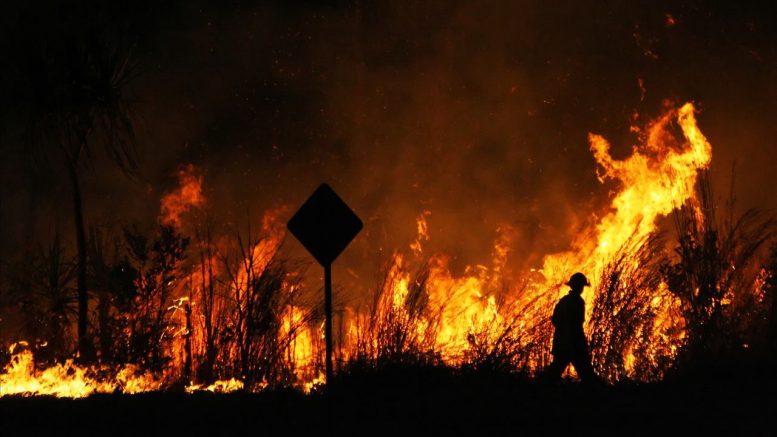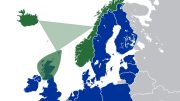The climate has turned terrorist against nature, but one dare not mention the words ‘climate change’ or ‘climate emergency’, writes Geoff Kitney
I am writing this wearing a gauze mask. As I look outside, everything is shrouded in thick grey air. I have not seen a drop of rain since September. Today it’s 36 degrees centigrade outside, tomorrow is forecast to be hotter. Summer is not yet half over.
Birds are sitting under a tree, gasping for breath in the smoke-filled air. Streams of small ants are coming into the house through imperceptible gaps, in search of water and coolness. Swarms of flies hang around doors and windows, hoping for an opening to allow them to escape the brutal outside atmosphere.
In almost every direction, not far from my present location, small armies of volunteers are battling to contain out-of-control bushfires. Many have abandoned their jobs and businesses to join the defence of lives and properties up and down much of the length of the east coast of Australia.
Fires are burning in rain forests that for eons have been too wet to burn but are now tinder-box dry and combustible. They will not be extinguished until the rain returns and no-one knows when that will be.
In almost five decades of association with south-eastern Australia I have never experienced anything remotely like this. The climate has turned terrorist against nature here.
But I dare not mention the words “climate change” or “climate emergency”.
The conservative government is determined to resist any climate change action which threatens Australia’s economically important resources industries – especially coal and natural gas.
Tweet anything on this subject suggesting that we are experiencing the long-forecast, increasing occurrence of extreme weather, linked to climate change, and I can predict with absolute certainty that there will be a ferocious response from Tweeters who make it their business to never allow such claims to go unanswered, often with viciously personal epithets.
Climate change denialism has been mobilised and politicised to the point that whenever and wherever there is a suggestion that something unusual has happened to the climate and that it would be wise to act to try to mitigate climate change, there is a loud chorus of voices across the spectrum of social media and mainstream media commentary and opinion ridiculing the idea and anyone who puts their name to it.
Australia’s conservative politicians – including the Prime Minister, Scott Morrison – are the lead voices in this chorus. To blame climate change for the fires was to introduce politics into the bushfire debate, Morrison and others said. That, they say, would be an insensitive thing to do when people are suffering terrible losses from the fires. Any debate should wait until the fire season has passed, out of respect for its victims.
Hard to watch: This is what it looks like when a bushfire engulfs a fire & rescue crew. Footage was taken ~3 p.m. local time New Years Eve in New South Wales. No crew members from Fire & Rescue NSW Station 509 were injured. #NSWFires #AustraliaFires pic.twitter.com/xXo2RyhGqM
— Josh Nelson (@josh_nelson) December 31, 2019
The debate, of course, is not waiting. The suggestion of shutting it down has turned it up.
A debate which was already divisive has become bitterly so.
The conservative government is determined to resist any climate change action which threatens Australia’s economically important resources industries – especially coal and natural gas.
Mining companies and individuals who have earned a fortune from them fund the conservative parties and think-tanks supporting their cause of delaying and minimising climate change mitigation. Environmental activists are equally determined to intensify pressure for more robust climate change mitigation measures.
The two are on a collision course, with the government threatening to outlaw any protest actions which “threaten the livelihoods of fellow Australians”. Green Party leaders have suggested that the government’s climate change defiance and its threat to take action to outlaw protest action are a threat to democracy.
With anti-protest laws set to be introduced into parliament in the New Year, the first year of the new decade now underway threatens to see climate change become a test of Australia’s democratic institutions and its traditions of openness and tolerance.
In this, it will be in step with much of the rest of the democratic world.
‘Advanced democracies are not overthrown. There are no tanks on the streets, no sudden catastrophes, no brash dictators or braying mobs. Instead, institutions are imperceptibly drained of everything which once made them democratic.’ UK Supreme Court Justice Jonathan Sumption
The 2020s promise to be a decade in which democracy will face the most serious challenges since before the collapse of Communism and the fall of the Berlin Wall.
The intensifying polarisation of politics which has recently swept much of the democratic world, fed by growing nationalism and political populism and made manifest in the increasing rejection of multilateralism and internationalism, is straining the fabric of democratic political systems.
Already there are powerful voices warning of the danger ahead.
In a pre-Christmas BBC lecture former UK Supreme Court Justice Jonathan Sumption – sometimes referred to as “The Brain of Britain” – suggested that democracy as we have known it is in danger.
“We will not recognise the end of democracy when it comes, if it comes,” he said.
“Advanced democracies are not overthrown. There are no tanks on the streets, no sudden catastrophes, no brash dictators or braying mobs. Instead, institutions are imperceptibly drained of everything which once made them democratic.
“The labels will still be there but they will no longer describe the contents.
“The façade will still be there but there will be nothing behind it. The rhetoric of democracy will be unchanged but it will be meaningless.
“And the fault will be ours.”
Evidence of the threat is easy to find.
Public confidence in the institutions of democracy – parliaments, political parties, their leaders, public officials, legal systems and the courts, public broadcasters and the mass media – is in sharp decline. Partisanship is raging like an Australian bushfire. New extreme political movements are emerging.
In Britain, public trust in democracy has been shaken to the core by Brexit. A decisive election victory to the Boris Johnson Conservatives has broken the political deadlock but there is now a huge risk that, if Brexit turns out to be the economic disaster that has been forecast, disillusionment with British democracy will become extreme and dangerous.
For the sake of the future of British democracy, it is to be hoped that Boris Johnson understands what he now is custodian of and how fragile it might prove to be if he mishandles the strong political position he now holds.
More important and more dangerous, though, is the situation in the United States.
This presidential election year in the US looms as a very dangerous moment in the US story.
US partisanship is intensifying and the conflict that will be generated by what threatens to be a vicious election campaign could run out of control.
Many who hope for the defeat of Trump will dream of a return to more normal politics, but the reaction of Trump extremists might be to decide to try to burn the house down. A Democrat President will face a massive task to try to govern a nation split asunder by extreme partisanship.
A victory for Trump will be equally worrying as he would be bound to double down on the extreme agenda of his first term. Where this would lead on issues such as the containment of China, as desired by US anti-China hawks, is a question to which there seem only to be dangerous answers. What will happen to the US economy with another term of “Trumponomics” is equally troubling.
And, of course, the impact of a further decline in US global leadership could have terrible consequences for the functioning of a rules-based international order and the prospects of concerted global action on climate change.
With anti-protest laws set to be introduced into parliament in the New Year, the first year of the new decade now underway threatens to see climate change become a test of Australia’s democratic institutions and its traditions of openness and tolerance.
Sitting here amidst a hot, smoky nightmare and facing an on-going state of emergency well into the New Year and possibly way beyond that, it is easy to get a sense that the challenges ahead in the third decade of the 21st century are going to require leadership which has been in terribly short supply in the decade just past.

Headline image credit: VanderWolf Images/Shutterstock.com




